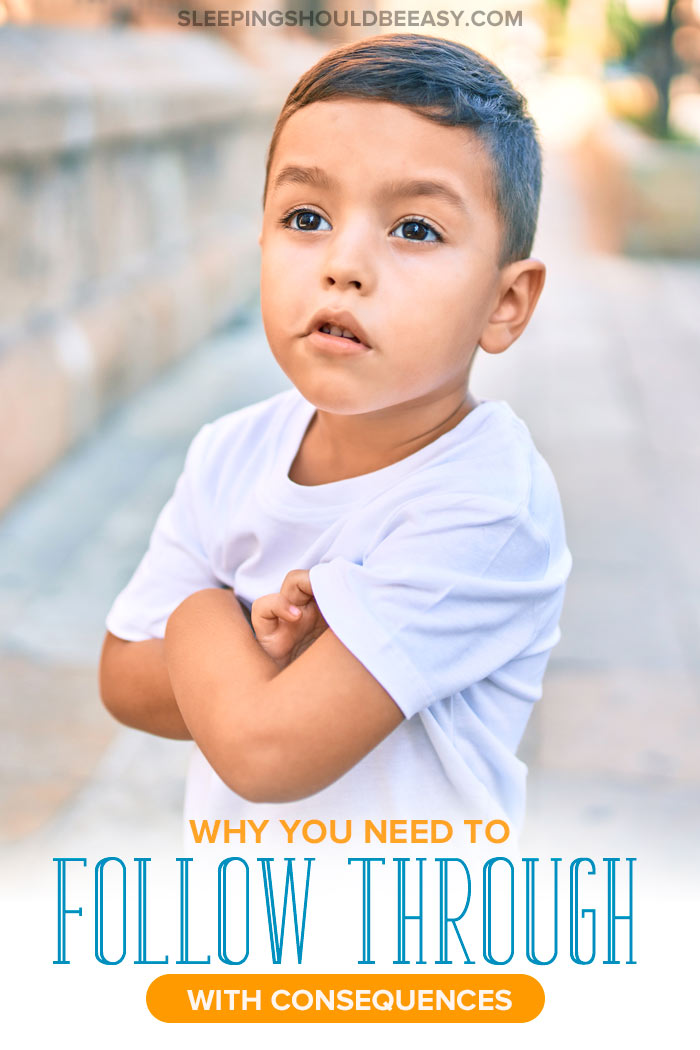Why You Need to Follow Through with Consequences (and How to Actually Do It)
Struggling when your child doesn’t listen? Learn why you need to follow through with consequences (and tips on standing your ground as a parent).
 “If you don’t pick these toys up, they’re going in the garbage bag,” I warned my son. He had been leaving random toys on the ground without cleaning up after himself.
“If you don’t pick these toys up, they’re going in the garbage bag,” I warned my son. He had been leaving random toys on the ground without cleaning up after himself.
But, as you might expect from a child testing his boundaries, he still refused to do his chore.
This hadn’t been the first time, either. He’d been pushing his limits all day, from not wanting to put his shoes on to throwing a fit about the food on his plate.
I wish I could say I held my ground during each outburst. Instead, I’d give him another chance, especially after seeing the disappointment and remorse on his face. Though I’d avoided yet another meltdown, I knew I was doing him a disservice when I didn’t follow through with consequences.
Table of Contents
Why we struggle to follow through with consequences
Perhaps you can relate. Your child may be testing your limits as well, forcing you to threaten consequences that you later don’t enforce. Why is it so hard for us to follow through with consequences?
-
- We feel pity. As angry as we may feel when our kids misbehave, we feel just as sorry when we see how remorseful they are. Following through becomes difficult especially as they plead with us and show a change of heart.
- We feel guilty. No one likes to see their kids in tears because of enforcing consequences. We may even assume we’re at fault, that we’ve made them sad and upset.
-
- It’s easier to give in. Disciplining young children, showing empathy, explaining their bad behavior—all this takes time and effort. It’s hard to follow through with consequences when giving in seems to stop the crying and whining right away.
Learn the real reason your child is testing you.

Why we should follow through with consequences
Despite the challenges with following through, I began to learn how much more effective it was to do so, especially in the long run.
I noticed better behavior in my son when I followed through with what I said I’d do. The work upfront began to shape his own decision-making process. Even the way he responded to instructions or discipline changed for the better.
Most importantly, our relationship improved from power struggles to mutual respect and trust. Sure, sticking by my word was difficult in the moment, but following through provided several benefits for both me and my son.
Take a look at several reasons to follow through with consequences:
1. Your child will learn right from wrong
You’re your child’s primary teacher—the person from whom he learns right from wrong as well as his values. By following through with consequences, he knows good behavior from bad.
You’re teaching him the natural and logical consequences of his behavior. If you don’t enforce them, he learns the lesson that his behaviors have no limits and assumes the world bends to his whims.
He also won’t thrive in total freedom—he can’t make mature decisions on his own yet. He needs you to teach him right from wrong with his best intentions in mind.
Free resource: Exhausted and feeling guilty from constantly yelling? Even if it seems like you’ve tried just about everything, you can stop losing your temper, if you start from the inside out and change from within.
In How to Finally Stop Losing Your Temper, you’ll learn to reflect on your habits and triggers and what you can do when you feel that rush of anger. Grab your PDF below—at no cost to you. You’ll also get my newsletters, which parents say they LOVE:
“Hello Nina, I’ve been subscribing to your newsletters for several months now & they’re all so helpful, realistic & uplifting. BUT this particular one came at a time when I had a mommy meltdown. I’m always feeling guilty or stressed that I’m not doing enough 1 on 1 time or that I’m doing too much (yelling!) and this newsletter made me realize that I’m enough for my kids because they are happy, safe, secure & healthy. I thank you for that. p.s. I forwarded it to all my mom friends! ” -Agata Juretko
2. Your child will take you seriously
No one wants to stop playing a game cut reading time short when her kids misbehave. But following through with what you say will get the message across that you mean your word.
Your child will call your bluff if you don’t enforce the rules consistently and regularly. Any “punishment” doled out is an empty threat—another phrase you say that won’t bear any action.
Enforcing consequences reinforces the trust she places in you. While you may not win short-term favor, you’re gaining her long-term trust.
Read about the downsides of making empty threats.

3. Your child learns accountability
No finger-pointing here. When your toddler receives consequences, he learns he’s accountable for his decisions. The consequences tie with his choices: His decision not to pick up the toys means he doesn’t get to play with them. You enforce, but his actions determine the outcome.
He’ll think through his choices and will be less likely to make impulsive decisions.

4. Following through shows you care
Ironically, setting limits and following through reassures your child that you care. Despite his protests, he wants boundaries, and someone who cares enough to go through the hassles of enforcing them.
Parents who don’t follow through will raise kids who will feel forgotten. Yes, in the moment, your child might feel angry and resentful, but he’d rather that you have his best interests in mind than let him get away with everything.
How to follow through with consequences
We’ve learned why it’s important to follow through with consequences, but, as we discovered earlier, doing so isn’t always the easiest to do. Take a look at the following ways you can hold your ground effectively:
1. Use natural consequences
Disclosure: This article contains affiliate links, which means I will earn a commission—at no extra cost to you—if you make a purchase.
Natural consequences are the direct results of your child’s choices and behavior. They make for the best consequences because they’re the way the real world operates. As the authors of Parenting with Love & Logic say:
“The real world operates on consequences. If we do a consistently lousy job at work, our boss doesn’t take away our VCR—he fires us.”
Let’s say your child refuses to clean up his toys. It’s tempting to confiscate an item or privilege, like not being able to watch TV. But watching TV (the loss of privileges) and cleaning his toys (the behavior) have little to do with each other. This not only confuses him, but directs the blame toward you, the enforcer.
Instead, let him experience the difficulty of finding his favorite toy as a result of not doing his chores. He may not experience this until much later, but he can better tie in how his choice led to his inability to find his favorite toy.
2. Follow through without anger or lecturing
The not-calm way to do it? “You’re not getting a cupcake after lunch if you don’t keep your voice down!” I yelled at my son in the car. My excuses: his brothers were sleeping in the car, and we were hungry and in traffic.
Still. The better way I should’ve done it? State the consequences as a matter-of-fact (and follow through just as calmly).
Later, my son was playing with a heavy plastic toy near his brothers, hovering it above their heads. “Please don’t hold it like that. It could fall and hurt them,” I said. “If you keep doing that, I’ll have to put it away until tomorrow.”
Of course, he continued to hover the toy over their heads, but I placed the toy in the closet for the rest of the day like I said I would, all without anger or lecturing.
I took my emotions out of the equation and emphasized that the consequences were a result of his actions. I wasn’t being the “mean mommy” acting out of frustration as I had done when I was angry in the car. I was applying the consequences to his misbehavior.
The best part? His reaction was by far one of the calmest I had seen. No uproar, resentment, or further stubbornness followed.
Read more about how to stop yelling at your kids.

3. Offer consequences you can follow through
Stick to feasible consequences, like not staying long at the park because she had taken forever getting ready.
You’re likely not going to throw all her clothes away, so don’t say you’re going to if she doesn’t get dressed. Farfetched consequences may work a few times because she’s shocked, but she’ll soon catch on.
Not only are these empty threats lies, they’ll also lead her to believe you less and less over time.
And use consequences appropriate for her age and stage. Don’t expect her to vacuum the mess she made on the carpet if she doesn’t know how to or is too small to even push the vacuum. Stick to consequences within her abilities, like helping you unwind the cord and spray the carpet.
Discover consequences for kids that actually work.

4. Be consistent
Like most things with parenting, consistency is key. Yes, it’s healthy to pick your battles, but following through helps your child understand his boundaries.
You’re human and can’t be on your A-game 100% of the time. But the more consistent you are—however difficult those first few times—the more effective your discipline will be.
He’ll start to pay attention and remember that you stick to your word. He’ll be less likely to misbehave because he knows what happens when he does.
Conclusion
Giving in seems easier, especially when you feel a mix of guilt and pity at your child’s change of heart or want to avoid another tantrum.
Still, sticking to your word is crucial. He’ll take you seriously and trust what you say. He’ll learn right from wrong, as well as the importance of holding himself accountable for his actions. And he knows you care enough to have his best interest in mind, even when it’s hard.
Following through with consequences isn’t about “punishments,” but providing the boundaries he needs. Even if it meant tossing a few toys in a garbage bag in the middle of his tears and protests.
Get more tips:
- What to Do when You Tell Your Kids No Too Often
- Setting Boundaries with Kids
- How to Discipline a Strong Willed 2 Year Old
Don’t forget: Join my newsletter and grab How to Finally Stop Losing Your Temper below—at no cost to you:


